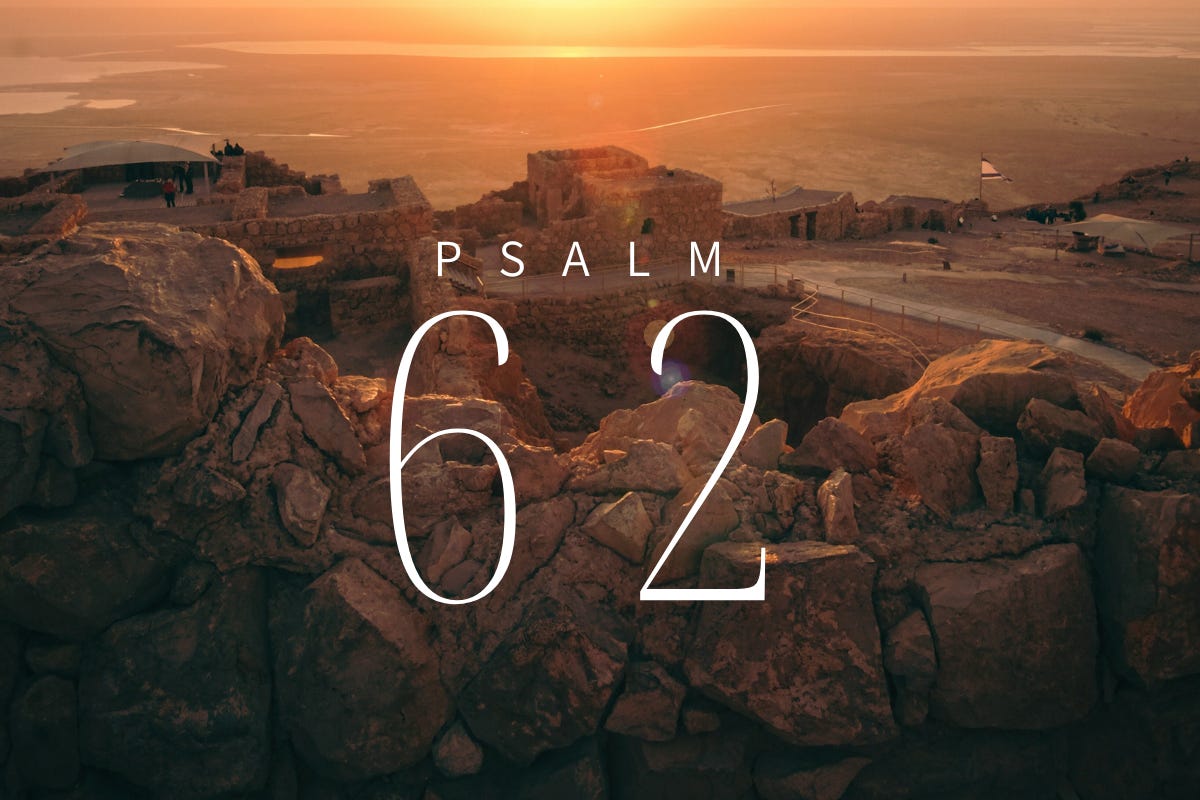This psalm begins with a war metaphor. David has fled to a mountain fastness where he is beleaguered and surrounded by enemies but is still safe. The first stanzas are full of the language of walls and plots and strongholds and high hideaways. Though he is assailed, the psalm begins with the powerful sentence: “I wait in silence for God alone.”
By the end of the psalm, David has quieted himself even in the midst of his struggle and waits for God’s eucatastrophe to find him. Though he is in dire straits, he forcefully reminds himself that all is not what it seems. Outward appearances and present struggles are not ultimate things. In the end, might and power belong to God. And “vast kindness” also.
Rendition of Psalm 62
I wait in silence for God alone. He is my rest and my salvation. He is the sure ground beneath my feet. Though I falter, I will not fall. Though I flee to my high retreat, I will not be overcome. How long will they assail me? They want to kill me and curse me. They want to bring me down, Like a breach in a bulging wall. They wear smiles and make bright words That carry only dust and lies. But I wait in silence for God alone. I quiet all my hoping in every other thing And wait only for him. He is the sure ground beneath my feet. Though I falter, I will not fall. Any saving that comes, Will come from him, my rock, My shelter, my God. I trust you, Lord. I pour out my heart before you. When I am lost at last, You are my refuge, my fastness. The children of men are only a mist, The high and haughty among them an illusion. When they are weighed in the balance, They are only a breath. Do not entrust yourself to ill-gotten gains, Nor hope in acquiring empty things. If wealth blossoms around you, Do not give your heart to it. God has spoken once And twice I have heard: Might belongs to God And vast kindness also. He brings back to all The fruit their own hands have sown.
Psalms: 1, 2, 3, 4, 5, 6, 7, 8, 9, 10, 11, 12, 13, 14, 15, 16, 18, 19, 20, 21, 22, 23, 24, 25, 26, 27, 28, 29, 31, 32, 34, 35, 38, 39, 40, 42, 43, 46, 50, 51, 53, 54, 62, 63, 65, 66, 73, 74, 75, 84, 86, 88, 90, 91, 100, 107, 110, 114, 117, 118, 119, 120, 121, 122, 123, 124, 125, 126, 127, 128, 129, 130, 131, 132, 133, 134, 137, 139, 140, 142, 147, 148.
Request the Darkling Psalter in Print
If you would like to move this project one step closer to publication, sign up on this form to request the Darkling Psalter in print.





Thank you for this, Andy. I am working at (trying to rest in) waiting in silence for God alone. And this psalm is a timely encouragement and vehicle for doing such.
Out of curiosity, how did you come by your Hebrew? Do you ever look at translations and scratch your head?